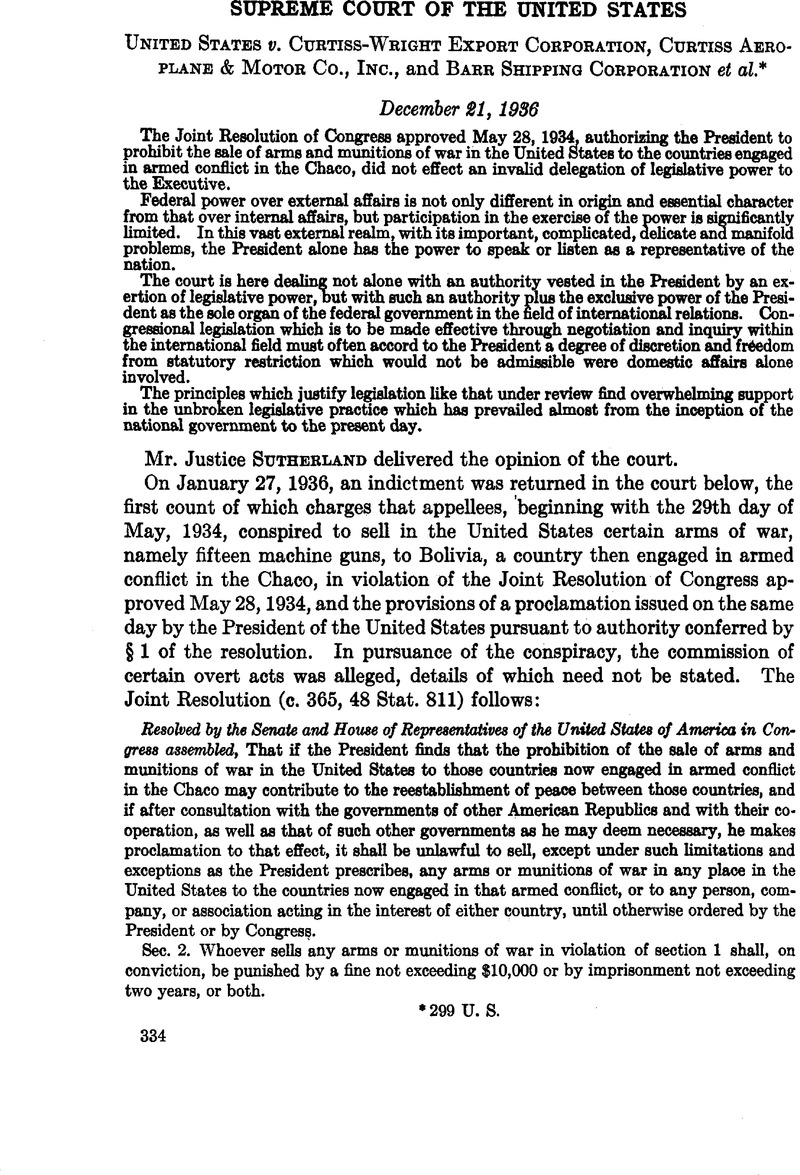No CrossRef data available.
Published online by Cambridge University Press: 12 April 2017

299 U.S.
1 In general confirmation of the foregoing views, see 1 Story on the Constitution, 4th ed., §§ 19–217, and especially §§ 210, 211, 213, 214, 215 (p. 153), 216.
2 Thus, the President has been broadly “authorized” to suspend embargo acts passed by Congress, “if in his judgment the public interest should require itȝ (Act of December 19,1806, c. 1, § 3, 2 Stat. 411), or if, “in the judgment of the President,” there has been such suspension of hostilities abroad as may render commerce of the United States sufficiently safe. Act of April 22, 1808, c. 52, 2 Stat. 490. See, also, Act of March 3, 1817, c. 39,§ 2, 3 Stat. 361. Compare, but as to reviving an embargo act, the Act of May 1, 1810, c. 39, § 4, 2 Stat. 605.
Likewise, Congress has passed numerous acts laying tonnage and other duties on foreign ships, in retaliation for duties enforced on United States vessels, but providing that if the President should be satisfied that the countervailing duties were repealed or abolished, then he might by proclamation suspend the duties as to vessels of the nation so acting. Thus, the President has been “authorized” to proclaim the suspension. Act of January 7, 1824, o. 4, § 4, 4 Stat. 3; Act of May 24, 1828, c. 111, 4 Stat. 308; Act of July 24, 1897, c. 13, 30 Stat. 214. Or it has been provided that the suspension should take effect whenever the President “shall be satisfied” that the discriminating duties have been abolished. Act of March 3, 1815, c. 77, 3 Stat. 224; Act of May 31, 1830, c. 219, § 2, 4 Stat. 425. Or that the President “may direct” that the tonnage duty shall cease to be levied in such circumstances. Act of July 13, 1832, c. 207, § 3, 4 Stat. 578. And compare Act of June 26, 1884, c. 121, § 14, 23 Stat. 53, 57.
Other acts, for retaliation against discriminations as to United States commerce, have placed broad powers in the hands of the President, “authorizing” even the total exclusion of vessels of any foreign country so offending (Act of June 19, 1886, c. 421, § 17, 24 Stat. 79, 83), or the increase of duties on its goods or their total exclusion from the United States (Act of June 17, 1930, c. 497, § 388, 46 Stat. 590, 704), or the exclusion of its goods or the detention, in certain circumstances, of its vessels, or the exclusion of its vessels or nationals from privileges similar to those which it has denied to citizens of the United States (Act of September 8, 1916, c. 463, §§ 804-806, 39 Stat. 756, 799–800). As to discriminations by particular countries, it has been made lawful for the President, by proclamation, which he “may in his discretion, apply … to any part or all” of the subjects named, to exclude certain goods of the offending country, or its vessels. Act of March 3, 1887, c. 339, 24 Stat. 475. And compare Act of July 26, 1892, c. 248, 27 Stat. 267. Compare, also, authority given the Postmaster General to reduce or enlarge rates of foreign postage, among other things, for the purpose of counteracting any adverse measures affecting our postal intercourse with foreign countries. Act of March 3, 1851, c. 20, § 2, 9 Stat. 587, 589.
The President has been “authorized” to suspend an act providing for the exercise of judicial functions by ministers, consuls and other officers of the United States in the Ottoman dominions and Egypt whenever he “shall receive satisfactory information” that the governments concerned have organized tribunals likely to secure to United States citizens the same impartial justice enjoyed under the judicial functions exercised by the United States officials. Act of March 23, 1874, c. 62, 18 Stat. 23.
Congress has also passed acts for the enforcement of treaties or conventions, to be effective only upon proclamation of the President. Some of them may be noted which “authorize” the President to make proclamation when he shall be “satisfied” or shall receive “satisfactory evidence” that the other nation has complied: Act of August 5, 1854, c. 269, §§ 1, 2, 10 Stat. 587; Act of March 1, 1873, c. 213, §§ 1, 2, 17 Stat. 482; Act of August 15, 1876, c. 290, 19 Stat. 200; Act of December 17, 1903, c. 1, § 1, 33 Stat. 3. Cf. Act of June 11, 1864, c. 116, § 1, 13 Stat. 121; Act of February 21, 1893, c. 150, 27 Stat. 472.
Where appropriate, Congress has provided that violation of the President’s proclamations authorized by the foregoing acts shall be penalized. See, e. g., Act of June 19, 1886; Act of March 3, 1887; Act of September 8, 1916; Act of June 17, 1930-all supra.